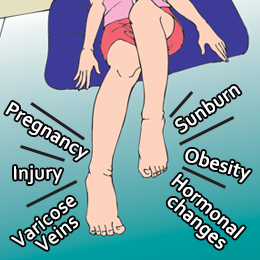Swelling in the legs and ankles can be a symptom of a number of health issues. Let us delve a little deeper, and find out the possible causes for the same...

If you or someone you know may have experienced swollen legs and ankles, then you know how uncomfortable it is. The swelling, known as edema, is caused by fluid retention in the spaces between the body cells. One of the following reasons can be the reason behind swelling in the legs and ankles.
Causes of Swelling in the Legs
Heart Failure: The degree of edema in legs and ankles depends on the ability of the heart to pump blood. If the heart fails to pump out more blood, kidneys tend to retain the fluid. This leads to edema in legs and ankles.
Kidney Disease: People suffering from kidney problems may experience edema. If a kidney fails to function properly, salts are retained in the body. This leads to water retention and swelling.
Lymphedema: Lymphedema or lymphatic obstruction often results in swelling in one of the legs. In rare cases, swelling in both the legs can be noticed. A blockage in the lymphatic system causes retention of lymphatic fluid in the legs. The swelling in legs and ankles due to lymphedema can be mild to extreme.
Lung Diseases: Severe chronic lung diseases like bronchitis or chronic obstructive pulmonary disease (COPD) may cause swelling in the legs. There is a restricted flow of blood in the vessels of the lungs, which causes swelling in many parts of the body including legs and ankles.
Sunburn: Sunburn is caused due to overexposure to sun. Strong sunlight causes redness and inflammation in the outer layers of the skin. Sunburn is one of the common causes of swelling in the legs and ankles.
Hormonal Changes: During menstruation, swelling is observed in the pelvic cavity and legs due to changes in certain hormones. However, not all women experience this symptom.
Pregnancy: Many times, there is a swelling in the legs and ankles during pregnancy. The fluid is retained in the tissues due to a change in the blood chemistry. In addition to this, the growing uterus puts pressure on the pelvic veins, which may lead to swelling. Swollen legs and ankles are normally observed in the third trimester of pregnancy.
Obesity: Obese people are more likely to experience swollen legs. Excessive pressure on the blood vessels in the legs (due to excess weight) leads to poor blood circulation and swelling in feet and ankles.
Varicose Veins: While standing or sitting, valves in the veins regulate the blood flow in legs and ankles against the gravitational force of the earth. Prolonged standing or sitting may lead to swelling in legs and ankles. Knotty or swollen varicose veins are often responsible for this.
Medications: Some medications result in water retention in the human body. Oral contraceptives containing estrogen and progesterone, blood pressure medication, some antidepressants, oral corticosteroids, and testosterone are some of the medications that may cause swelling in the legs and ankles.
Other Causes: Injury to legs, insect bites, increasing age, certain chronic diseases, malnutrition and standing or walking for a long time in extreme weathers, are some of the other causes of swollen legs and ankles. A long airplane flight may also lead to puffy legs and ankles.
Home Remedies
Some home therapies that can help reduce the swelling are as follows:
- You must lie down and keep your legs elevated above your heart, for some time. This helps reduce the quantity of fluid in legs.
- Applying an ice pack on the swollen part from time to time helps reduce swelling and pain. Excessive application of ice can lead to frozen nerve and other health complications.
- You must exercise daily to reduce weight. Healthy weight loss helps improve the pumping activity of the heart. A stress-free lifestyle helps maintain heart health.
- Dietary changes may help in reducing the edema. Vitamin B6 that will help reduce water retention in the body, is found in brown rice and red meat. Vitamin B5, calcium and vitamin D help in the excretion of excess fluids.
- A low-salt diet can help reduce the levels of salt in the body which, in turn, can help reduce water retention. Eating fresh fruits and vegetables can also help to some extent.
It is always advisable to consult your doctor when you observe swelling in your legs or ankles, especially if the symptom persists for a long period or is painful. If severe swelling in legs and ankles is ignored for a long time, it may lead to complications.
Disclaimer: This Buzzle article is for informative purposes only, and should not be used as a replacement for expert medical advice.


 If you or someone you know may have experienced swollen legs and ankles, then you know how uncomfortable it is. The swelling, known as edema, is caused by fluid retention in the spaces between the body cells. One of the following reasons can be the reason behind swelling in the legs and ankles.
If you or someone you know may have experienced swollen legs and ankles, then you know how uncomfortable it is. The swelling, known as edema, is caused by fluid retention in the spaces between the body cells. One of the following reasons can be the reason behind swelling in the legs and ankles.